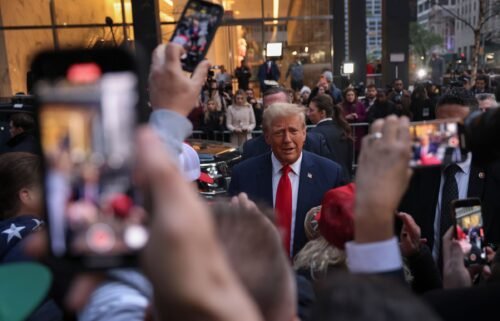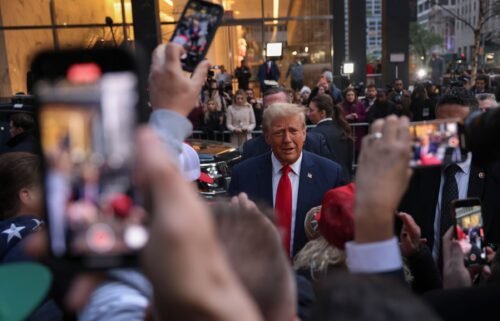After Trump debacle, Ukraine has one card to play

When Volodymyr Zelensky announced his candidacy for president of Ukraine after promising to bring peace to the war-torn eastern part of the country, he could not have known that US President Donald Trump would wind up threatening to withhold almost $400 million in military and economic aid unless Zelensky, a former TV comedian, dug up dirt on Trump’s political opponents.
And once the scandal broke into the open, and Trump opted for the low road by claiming he’d withheld the aid because Ukraine is an inherently corrupt nation — a refrain that would be repeated endlessly by the commander-in-chief and his inner circle — the Zelensky team opted to avoid public comment, hoping they could ride out the negative narrative and hope the situation might in fact stir sympathy for the embattled country.
As Olena Tregub, Secretary General of NAKO, an anti-corruption NGO focusing on the defense sector, an initiative of Transparency International, told me: “Ukraine was at the wrong place at the wrong time — it could have been any other country getting caught in this uncomfortable situation with Trump.”
In the meantime, Zelensky and his team are having to navigate a tricky and complex peace process with Moscow not knowing whether they have the full backing of the Trump administration should things go sideways. Let’s face it — how can a legitimate negotiation with Russia occur when Russia refuses even to admit that it’s backing the rebels fighting in eastern Ukraine?
Complicating matters even further, politicians in many European capitals are said to be softening their support for the Russian sanctions imposed after the 2014 forced annexation of Crimea. A good example of this changing attitude toward the Kremlin came last July when, in a first rollback of Crimea sanctions, Russia was re-admitted to the Council of Europe, Europe’s main human rights forum, after lobbying by France and Germany.
Ordinarily, Ukraine, a traditional ally of the United States, can expect high-level backing from Washington in its dealings with Russia. But a Trump White House distracted by impeachment hearings and accusations that it tried to extort Zelensky for dirt on Joe and Hunter Biden leaves a void that Russian President Vladimir Putin could take advantage of.
During my time in Ukraine with the Organization for Security and Cooperation in Europe (OSCE), I know that when the then-US ambassador spoke, he or she did so confident in the full backing of the State Department and the President. Now Trump doesn’t even have a US ambassador in Kiev after prematurely recalling former Ambassador Marie Yovanovitch to the United States. Instead, the job of representing the United States is in the hands of career diplomat William Taylor, who after presenting incriminating testimony about Trump in congressional hearings two weeks ago, can best be described as a lame duck envoy.
I met Taylor last week, and while he shows an unquestionable commitment to Ukraine’s security and well-being, it is doubtful — especially after his trip to Washington, during which he provided some of the most incriminating evidence to date against Trump — that he enjoys speed-dial access to the Oval Office. He and other current and former diplomats assured me that despite the machinations going on in Washington, Ukraine can count on strong bipartisan support on Capitol Hill.
But when the leader of the strongest nation harbors a deep, almost inexplicable dislike for Ukraine while holding a soft spot for Putin, that makes for a much bleaker and more uncertain future for Zelensky and his country. Putin thrives on chaos and disunity and is bound to exploit any crack in the longstanding US-Ukraine relationship.
An emboldened Putin already seems to be pressing hard for a peace deal that former Ukrainian president Petro Poroshenko and his foreign minister describe as a capitulation. Essentially it would pave the way for elections that could bring semi-autonomy to the regions in the Donbas region occupied by Russian-backed rebels — with little of the safeguards demanded by Ukraine.
As the days tick by and Ukrainians become increasingly weary of a lopsided deal, the prospects for a final signing and landmark peace summit proposed by French President Emmanuel Macron appear increasingly distant.
Progress on the domestic front
Fortunately for Zelensky, whose Servant of the People Party commands a majority in the Ukrainian parliament, he has accomplished some laudable successes on the domestic front. Early in his term, he was able to obtain the release of captured Ukrainian sailors from Russia as well as prominent political prisoners. And a popular law stripping immunity from prosecution for members of parliament passed easily in September.
But compared to the heady days of Zelensky’s landslide wins in the presidential and parliamentary elections, the general mood in Kiev, based on my conversations with a wide range of people, including business and civil society leaders, now seems to have turned toward a cautious optimism at best and, at worst, an outright fear that Zelensky won’t survive a full term in office.
Aside from the shaky and unpredictable peace process, Zelensky is facing other problems at home. Attempts to overturn a long-standing ban on the sale of farmland have faltered, a push toward judicial reform has sparked criticism from western partners, and fresh accusations have surfaced that Zelensky is going too soft on former business partner and Ukrainian oligarch Igor Kolomoisky, who is battling to get his nationalized bank, PrivatBank, returned. And just weeks into his presidential term, the Zelensky team lost one of its most experienced western-educated technocrats, national security chief Oleksandr Danylyuk.
As for the policy of remaining silent and not fighting back while Trump and his inner circle continue to trash Ukraine as corrupt, Ukrainian diplomatic sources tell me the Zelensky team is re-evaluating this strategy for fear it may drive away badly needed foreign investment, especially from the United States.
But there’s an even better way for Zelensky to regain his voice: He should be bold and adopt the aggressive approach of Israeli Prime Minister Benjamin Netanyahu, who in 2015 made an elaborately planned end-run around the Obama White House to speak directly to the American public in an address before a joint session of Congress. If the bipartisan support that Taylor and others refer to is real, then Zelensky should have no problem securing such a high-profile invitation and speaking boldly before Congress.
After Zelensky’s somewhat awkward coming-out ceremony in the United States in that press conference with Trump on the sidelines of the UN General Assembly, a forceful speech before Congress could be the diplomatic masterstroke of the decade for Ukraine, and set the country on a new trajectory. Such a speech would represent an unprecedented opportunity to counter the Trump-led negative narrative on Ukraine currently circulating in Washington — and to remind lawmakers why they should continue their traditional strong, bipartisan support of the former Soviet republic.
After all, Trump is freelancing with American foreign policy. Why can’t Congress take some liberties too?




